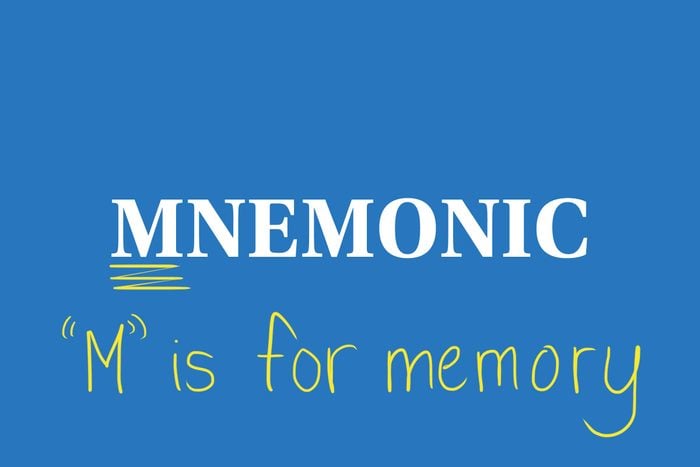
Mnemonic
Let’s start with a toughie. Mnemonic devices are memory aids that help you remember anything—but they’re often used for spelling. You’ve probably heard the adage “i before e except after c”. You can use familiar mnemonics, but teacher Irena Dewey suggests that you also create your own personal ones because they’re anchored to your own memory. So, what’s a good way to remember the strange spelling of a mnemonic with its silent “m” at the beginning? Merriam-Webster recommends you keep in mind that even though its “pronunciation begins with an ‘n’ sound, the spelling begins with an ‘m,’ as in memory.” M for memory! Don’t forget! Check out these 14 words that are hard to pronounce.
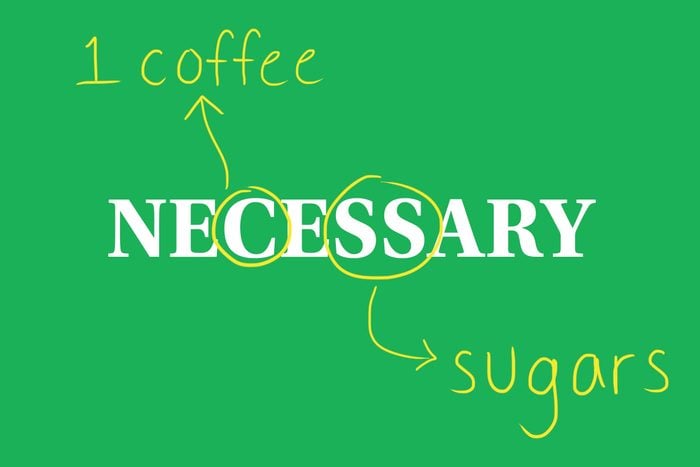
Necessary
Necessary is a tough one that often appears with two “c’s,” like “neccessary.” Folks aren’t sure which consonant gets a double letter so you may see “neccessarry” appear, too. English doctoral student, Stephanie Allen offers using the mnemonic “one collar and two socks,” to remember a single “c” followed by two “s’s.” The logic goes that the collar is at the top of your body and the socks, second, at the bottom. Or you could use something like “one coffee, two sugars”—the necessary items to start your morning off right!
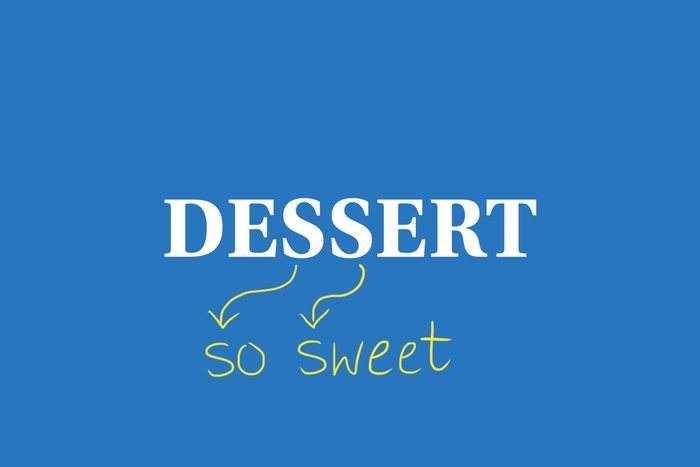
Dessert
Dessert gets complicated because you might confuse it with “desert.” One is traditionally the final course of a meal—but feel free to eat it first! The other is known for sweltering heat and cacti. Don’t forget the verb form of “desert”—to abandon a post. To make it easy, use a mnemonic like “so sweet,” to remember the double “s” in dessert. Here are 19 palindromes—words that are spelled the same backward and forward.
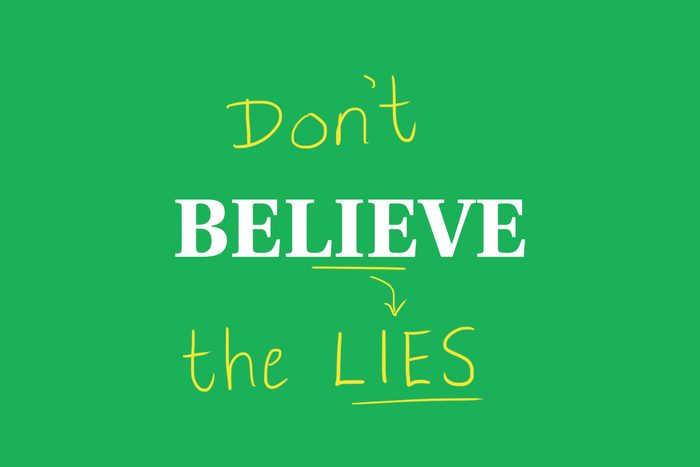
Believe
Is it believe or beleive? You can always pull out the ol’ “i before e except after c” reminder or use the famous mnemonic that goes with the word. Think of the phrase “don’t believe the lies” to remind you that the word “lie” is right in the middle of be(lie)ve. Then you’ll always get those vowels in the right order.
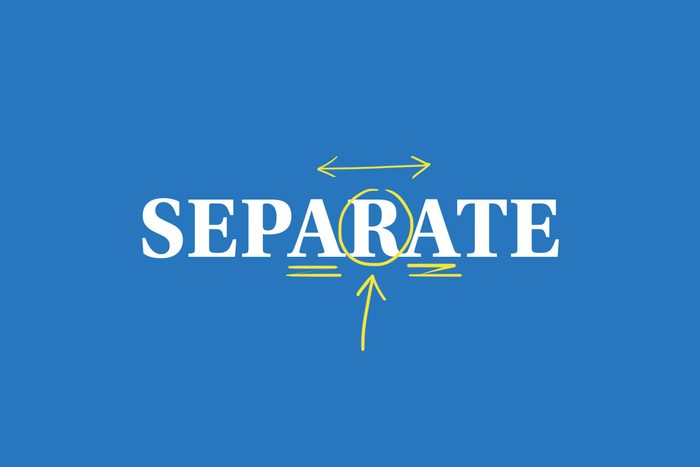
Separate
It’s super common to misspell separate as seperate—with three “e”s and one “a.” Grammarly suggests a great mnemonic that makes it easy to always spell this one right. Remember that “r” separates two “a”s. Keep this easy trick in mind and you’ll always spell separate correctly. Check out these 16 spelling rules you should memorize.
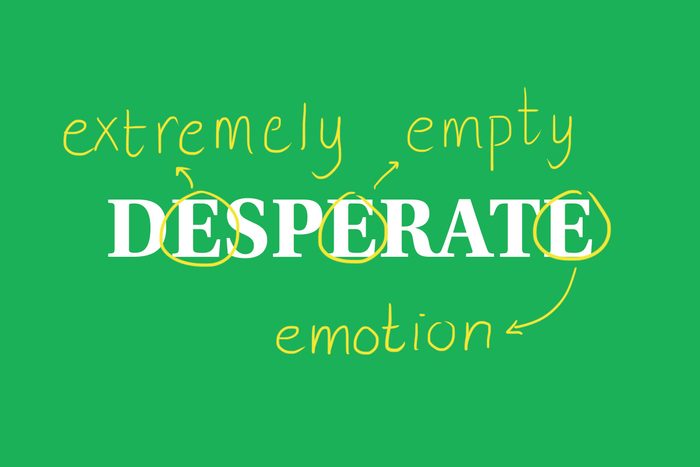
Desperate
Maybe because separate is spelled with two “a’s” in the middle, people want to apply the same thing to desperate. As in, “desparate.” That spelling often shows up even though it’s incorrect. Desperate means despair and hopelessness to the extreme. Use the mnemonic “extremely empty emotion” to remember that desperate has three “e’s.”
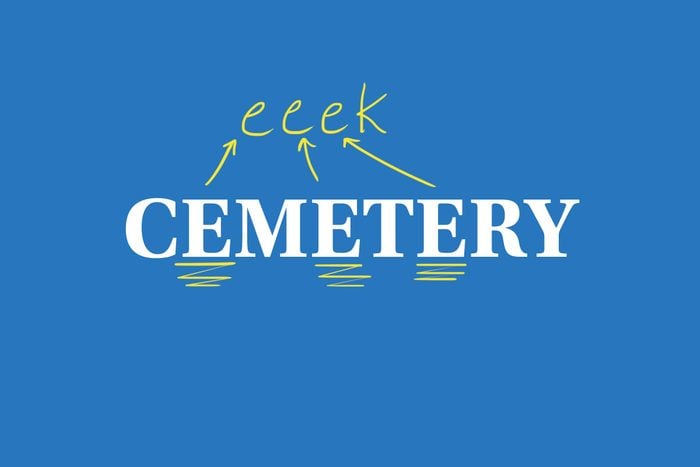
Cemetery
Cemetery often gets spelled as “cemetary,” with an “a.” In the case of Stephen King’s horror classic Pet Semetary, the misspelling signals the way a kid would write it. Cemeteries can’t seem to shake their reputation as terrifying locales. Therefore, Grammarly recommends that you use “eeek” as a memory aid to help you remember all those “e’s.” Don’t miss these 10 winning words from spelling bees.
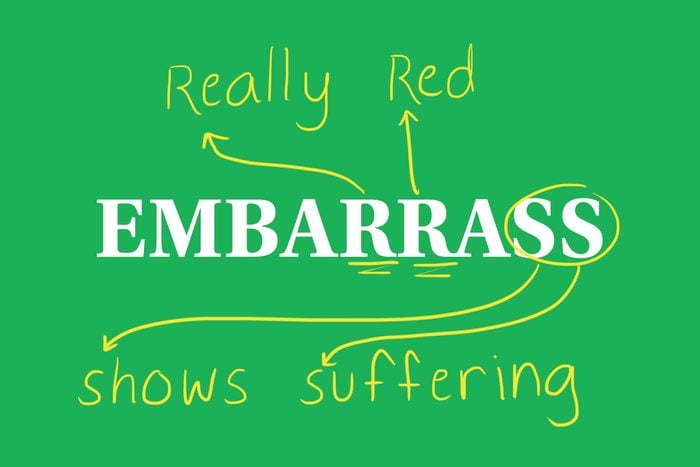
Embarrass
It shouldn’t be so embarrassing to misspell words. Nobody’s perfect. Embarrass is one of those words that people find tricky. Just remember that it requires two sets of double letters. Two “r”s and two “s”s. Remember “really red shows suffering.” That’s what your cheeks will do when as you die of embarrassment. Don’t miss these funny spelling mistakes.
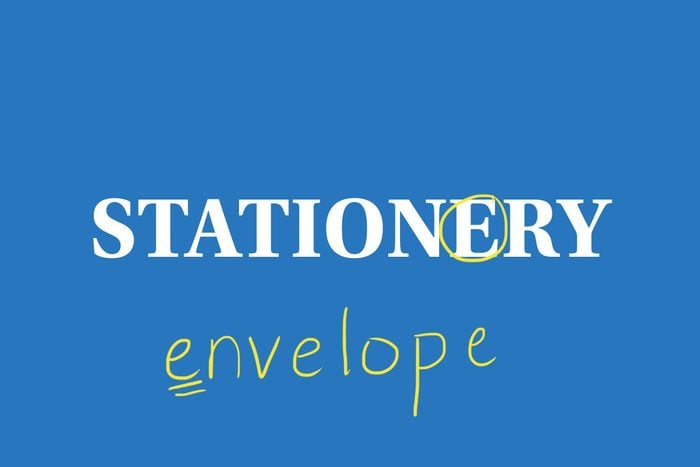
Stationery
Stationery is another homophone. That’s the term for words that have the same pronunciation but different spellings and meanings. There’s also stationary. So which is which and how can you remember? Stationery is the word for paper goods used for letter writing. Paper and an envelope. So remember to spell this with an “e” for envelope. Stationary refers to something anchored or at a standstill. Use those “a” words and phrases to help you remember.
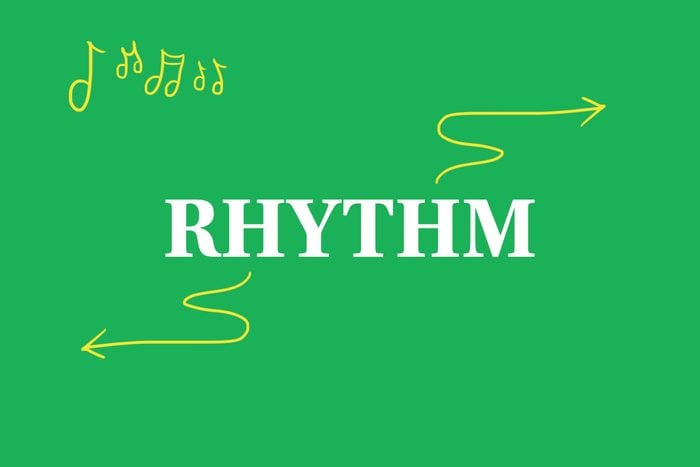
Rhythm
No vowels in rhythm. Lots of consonants. How can you remember how to spell this tricky word? Think of what rhythm’s all about. Musical mastery and the pattern that accompanies a beat. And also movement. So shake your hips. This side, then that side. Good. Now, remember two “h”s for two hip swings. Spelling rhythm is as easy as shaking your hips back and forth.
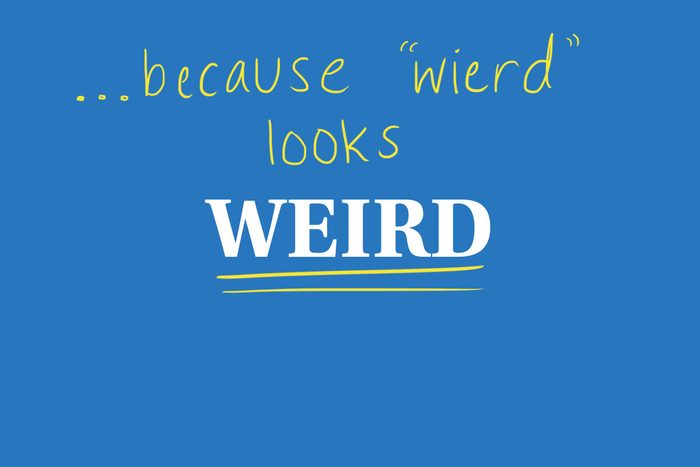
Weird
Weird looks so weird when it’s spelled “wierd,” even though it commonly is. The well-known mnemonic “i before e except after c” does not work for weird. Another exception to that rule is to use “ei” instead of “ie” when the sound is an “a” as in neighbor and weigh. You’re just supposed to notice how weird these “ie” and “ei” rules are and spell weird accordingly.
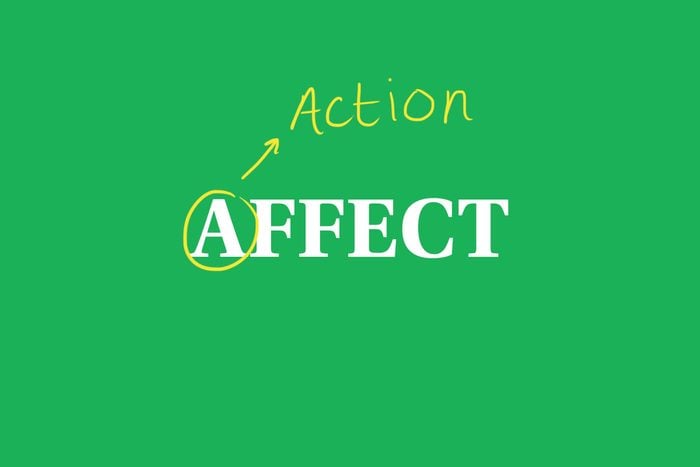
Affect
Affect is a homophone with effect. Not only is it easy to confuse which one to use when, but the right way to spell each of them is also confusing. Spellzone offers a great way to make sense of the difference. Keep in mind that affect describes an action. So use the “a.” Effect is used to refer to an “end consequence,” so use an “e.”
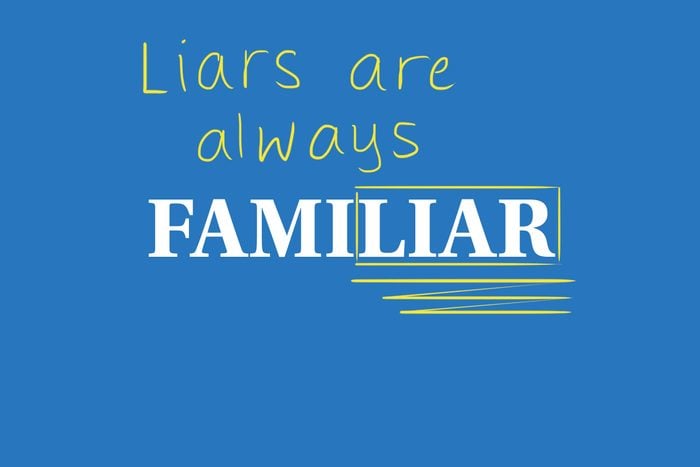
Familiar
Most mnemonic advice for the oft-misspelled word familiar asks that you notice the word’s ending. Create a memory aid that uses the word “liar” so you always remember that familiar has a second “i.” Tell yourself you can recognize lies with ease. Liars are always familiar to you. That should work!
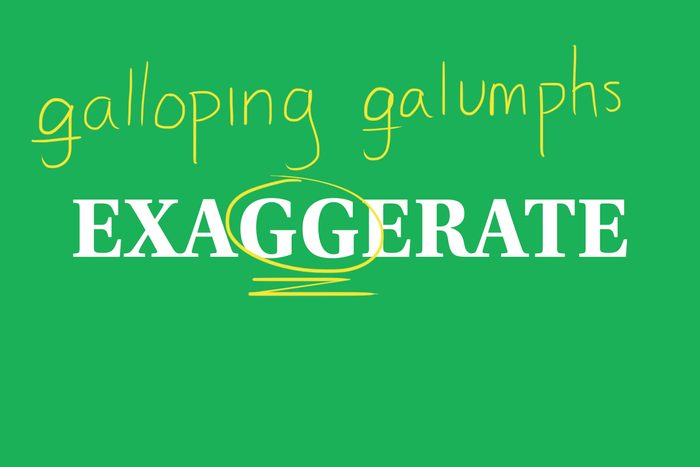
Exaggerate
It’s common for folks to forget that exaggerate is spelled with two “g”s. Go ahead and create a memory aid that uses two “g”s to remind you about this word’s spelling. Go for something that exaggerates on purpose like “galloping galumphs” exaggerating “great guidance.”

Accommodate
Such a big word. So many possibilities for doubling up on certain letters. Richard Nordquist at Thoughtco recommends using the word’s definition to remind you how to spell it. The word can accommodate double letters for “c” and “m.” Here are 9 spelling mistakes that spellcheck can’t catch for you.
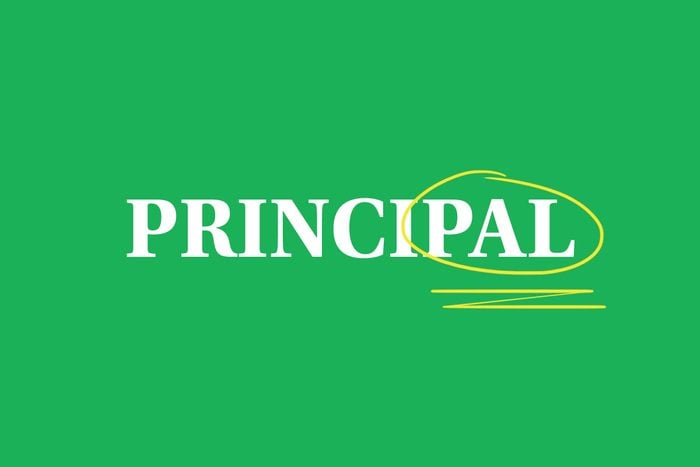
Principal
Get ready for another homophone: principle and principal. Which is which? Principle refers to an accepted tenet or law. Principal is the name for the fearless leader running your school. You two are friends, right? You’ll need to be for this memory trick to work. The principal is your “pal.” Get it? Remember that figure is a friendly pal and you can remember how to spell the word.
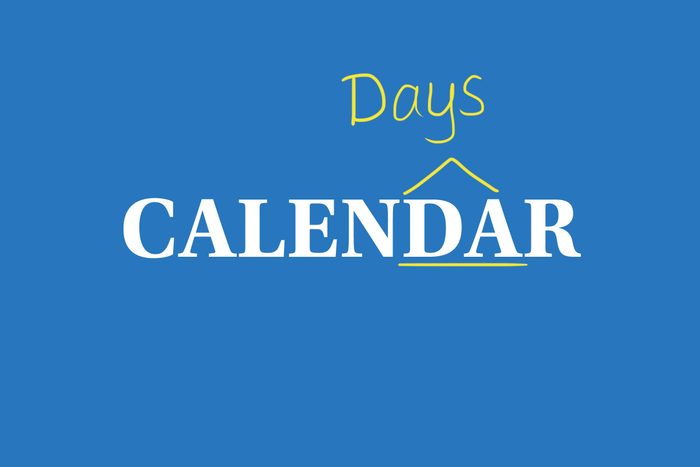
Calendar
Calendar is commonly pronounced as if it would be spelled calender, with an “e” in the last syllable. Remind yourself that a calendar is a record of days. So be sure you use “da,” like days, at the end. Now that you know these spelling tricks, see if you can spell the most misspelled words in America. And next, check out these 7 common words that mean the opposite of what you think.
